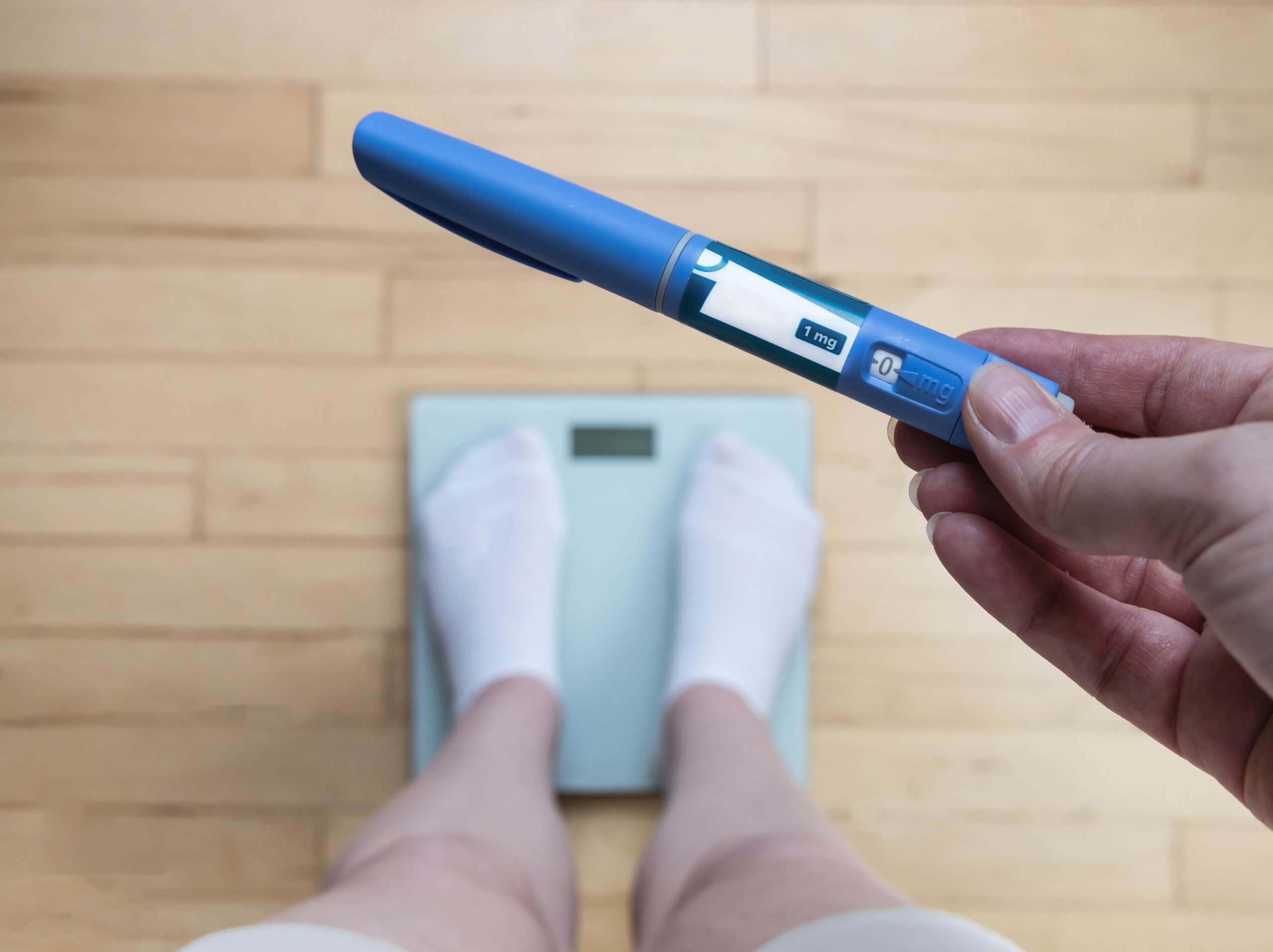Weight Loss Medication


How do weight loss medications work?
Weight loss medications act in a variety of ways to help patients lose weight and maintain their weight loss. They reduce hunger and appetite and help patients feel full quickly so that they can eat smaller portions, make healthier food choices and minimise snacking between meals. Some medications help with food cravings as well.
Weight loss medications for obesity are only effective if they are combined with sustained lifestyle change. Patients generally do better if they are also working with a team of health professionals such as the team of doctors, nurses and dietitian at Upper GI Surgery, alongside their GP and other professionals such as a psychologist and an exercise physiologist. At Upper GI Surgery we are committed to the health and wellbeing of our patients and are keen to support and walk alongside our patients as they manage their obesity well.
Am I a candidate for weight loss medication?
Weight loss medication can be used for people who wish to lose excess weight without surgery, those who may have experienced weight regain after surgery, or are having difficulty managing their weight long-term.
Adults with excess weight (BMI > 27) who also have weight-related medical problems (such as high blood pressure, type 2 diabetes, sleep apnea) or adults suffering from obesity (BMI > 30) may be eligible for weight loss medication.
If you are considering weight loss medication, the next step is making an appointment with one of the doctors at Upper GI Surgery – they will discuss the medications for weight management that are available for you and choose the medication that is most appropriate for your individual needs.
Weight loss medication – potential side effects
Most of the medications for weight management cause some gastrointestinal side effects such as nausea, constipation or diarrhoea. To avoid this as much as possible, most medications are started at a low dose and increased slowly to allow these to settle, determining the optimal dose for each patient to balance side effects while losing weight to achieve their goals, set in consultation with a doctor.
How effective is weight loss medication long-term?
It is important to understand that after a time, weight reaches a maintenance state and from that time the medication helps prevent weight regain rather than continuing to cause further weight loss. If the medication is stopped then it is likely that your weight will start going up again and over time you may regain all or most of the weight you have lost.
This is because our brain remembers our maximum weight and changes the hormones to drive the weight back up again. This is part of the normal pattern for Obesity so your doctor understands that long-term weight management is hard at times. We encourage patients to reconnect with our team if their weight is tracking up more than 3kg so we can help before it tracks up any further.
Weight loss medication costs
One of the considerations to discuss with your doctor is the cost of weight loss medications as they are not subsidised by the Australian Government on the PBS. The cost of weight loss medication will vary depending on the specific medication and the optimal dose that the patient requires – increased dosage increases the cost of the medication.
In recent times, some weight loss medications have been in short supply in Australia and globally, so you may need to swap to another medication for a time until the original medication is available again. (For patients – if this happens to you, please contact our rooms to arrange an appointment so we can review your treatment).
If you would like to speak with our bariatric care specialist about weight loss and weight management medications, please call us to make an appointment on (02) 9553 1120.
Weight loss medication for weight regain after bariatric surgery
Although bariatric surgery is a fantastic tool used to aid in weight loss, it requires important lifelong commitments to a change in diet and activity levels (exercise) to be effective in the long term. Even with consistent healthy lifestyle changes, some weight regain can and does recur.
Typically, some weight regain can be expected to occur after 12-24 months, and while in some the weight gain is minor, in others it is progressive which can be very disheartening. From our clinical experience, patients who attend regular follow-ups with their clinic, tend to regain less weight than those who don’t come back for follow-ups.
If someone is struggling to lose weight they have regained through diet and exercise alone, non-surgical weight loss treatments can help them get back on track and lose the regained kgs. Weight loss medications can assist with things like hunger and weight loss while you work on some of the “triggers’ that have led to weight regain.
If you would like to speak with the Bariatric Care Specialist about weight loss and weight management medications, please call us to make an appointment on (02) 9553 1120 or
FAQs
Are weight loss medications safe?
If you experience nausea, we advise that you eat smaller meals, avoid fatty foods and take your time to eat more slowly. There are medications our doctors can also prescribe to help with nausea. If you experience constipation, increase your fluid intake, eat more vegetables, consider using a fibre supplement such as Metamucil and if you still have constipation you can use a laxative such as lactulose or movicol.
You shouldn’t increase your dose of weight loss medications until your side effects are under control. More serious and troublesome side effects and complications occur in about 1 in 200 patients which is a similar rate to a wide range of commonly prescribed medications for other health conditions. You can visit the website of your prescribed weight loss medication, to learn about the risks in more detail.
How long do I need to take weight loss medication?
Some patients are able to stop weight loss medication and keep weight off if they continue to work on lifestyle management strategies. Other people do better with continuing on medication, often at a lower dose or with intermittent dosing, alongside lifestyle management in the longer term. It is important to monitor your weight regularly as you may need to restart your medication if your weight increases more than 3kg after stopping.
What are the long-term effects of weight loss medication?
If you use weight loss medications and don’t eat a proper diet (including eating adequate amounts of protein and a wide range of fruit and vegetables), don’t drink adequate fluids or exercise (including resistance exercises), you will be at risk of muscle and bone loss or vitamin and mineral deficiencies.
How much weight can I expect to lose with medication?
Is weight loss medication covered by insurance?
Can I take weight loss medication if I have diabetes?
Are weight loss medications suitable for older adults?

Why Choose Us

3 Years of Follow-up Appointments
Our patients benefit from having access to follow-up appointments with a Bariatric Specialist for up to 3 years after surgery, which is included in the clinic fee.

Over 20 Years of Experience
Our Bariatric surgery expertise is second to none. We have Australian-leading experience in many procedures, including the less commonly performed complex revision and robotic surgery.

Our Dedicated Support Team
Our welcoming and committed team is comprised of Nurses, Dietitian and Psychologist, as well as Admin support staff, making sure you are in the best hands for the duration of your treatment and the crucial aftercare period.

Multiple Clinic Locations in NSW
You can visit us at one of our many clinics in NSW - our main practice is located in Kogarah, and we also run clinics at St Vincent’s Clinic (Darlinghurst), Illawarra Family Medical Centre (Wollongong) and Orange Specialist Clinic.

Bariatric Centre of Excellence
Surgical Review Corporation (SRC) accreditation is achieved by providing the highest quality of care to patients as determined by an independent, external process of evaluation.

Bariatric Surgery Registry (BSR) Leading Contributors
We have contributed data since the BSR was first available in NSW and are pleased to report that our audit results are excellent. Audit is part of the “quality mindset” driving us towards excellence.
VLED (Very Low-Energy Diet)
A very low-energy diet (VLED) or otherwise known as a very low-calorie diet (VLCD), replaces meals with commercially available drinks or bars. Used alone provides 600–800 calories per day, or in combination with a typical meal provides 1200 calories per day. Used frequently by specialist weight loss clinics, but requires supervision.
For long-term results, it is best given as part of a diet plan that will have the patient moving onto a supervised reduced-energy diet with exercise. It is one of the easiest and most reliable methods of rapid weight loss available if patients can be compliant, and is associated with the best long-term results.
At Upper GI Surgery, our Bariatric Care Specialist Dr Jennifer Matthei and Dietitian Tania Chaanine can discuss with you the option of a VLED to assist with excess weight or weight management.

Sign up to receive our free Bariatric Surgery Guide
Everything you need to know, including our clinic cost, procedure options and much more.

